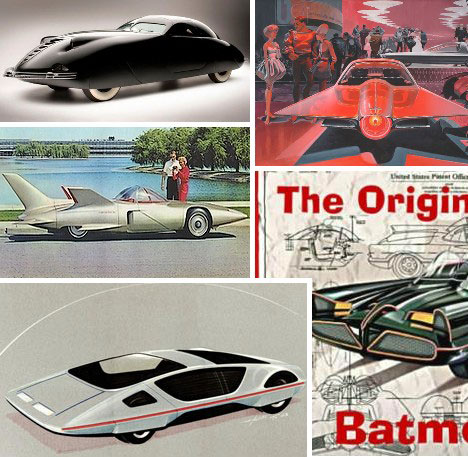
Detroit’s Depression Dreams
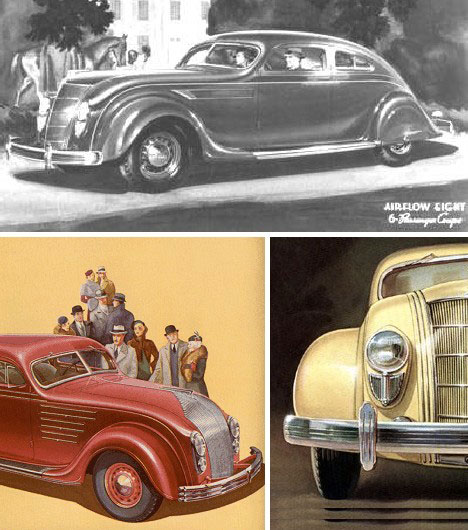 (images via: Old Car and Truck Pictures and CARstyling)
(images via: Old Car and Truck Pictures and CARstyling)The domestic auto industry had a tremendous run over the past century and thought things look grim today, there’s always hope for tomorrow. Can Detroit’s Big Three pull one more rabbit out of their tattered hat? If adversity truly is the mother of invention, they just might! Or not – The Great Depression spurred Chrysler to introduce the advanced Airflow series, but overwhelming rejection by the public caused the line to be discontinued before it really got rolling.
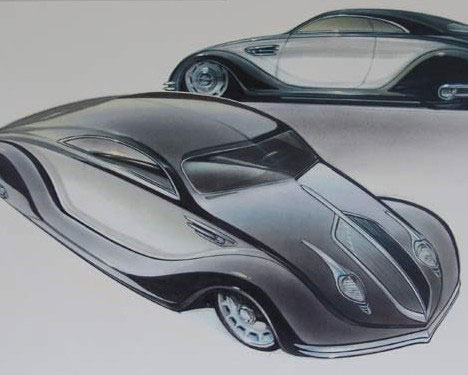 (images via: Steve’s Auto Restorations)
(images via: Steve’s Auto Restorations)What would the Airflow look like if it was allowed to reach its full potential? Steve Frisbie of Steve’s Auto Restorations, Inc. and auto designer Chris Ito have a pretty good idea: The hemi-powered Phantom Airflow shown above.
Phar Ahead of its Time: The Phantom Corsair
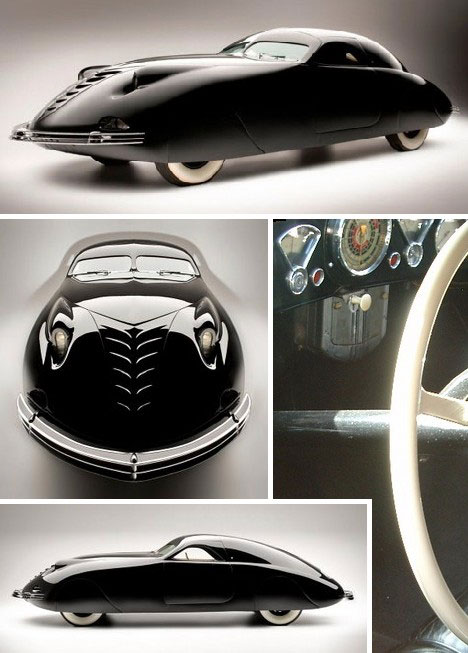 (images via: Miami New Times and Just a Car Guy)
(images via: Miami New Times and Just a Car Guy)The 1938 Phantom Corsair cost ketchup heir Rust Heinze $24,000 to build – that’s $300,000 today – and he hoped to sell production versions for half that price. Sadly, Heinz passed away shortly after this single prototype was made and his supercar dreams died along with him. As for the Phantom Corsair, its futuristic design was a huge influence on the designers of the day and many of its features would find their way onto production cars decades later.
Dymaxion: The Minivan That Might Have Been
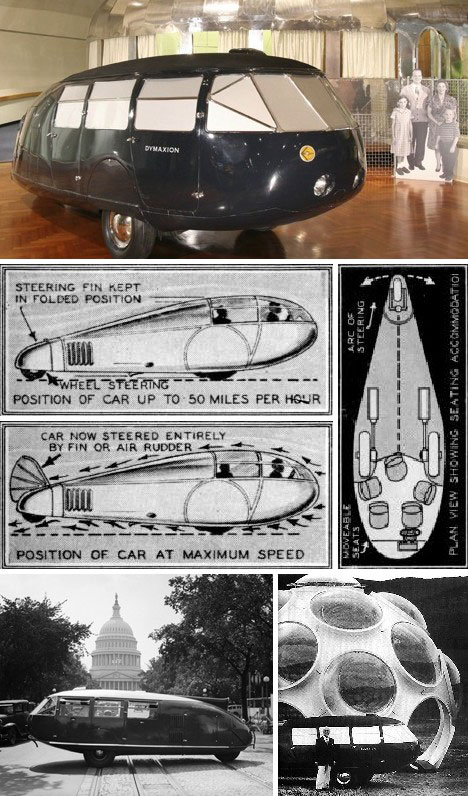 (images via: Blue Jay Way and David S Zondy)
(images via: Blue Jay Way and David S Zondy)The Dymaxion was the brainchild of visionary designer Buckminster Fuller, known for his large geodesic domes at Expo 67 and Disneyworld, and tiny “Buckyball” molecules. Long before those, however, was the Dymaxion – a spacious 3-wheeler whose name is a combination of the words “dynamic” and “maximize”. Only 3 were made, which actually isn’t too shabby a production total – for 1933.
Thunderbolts Are Go!
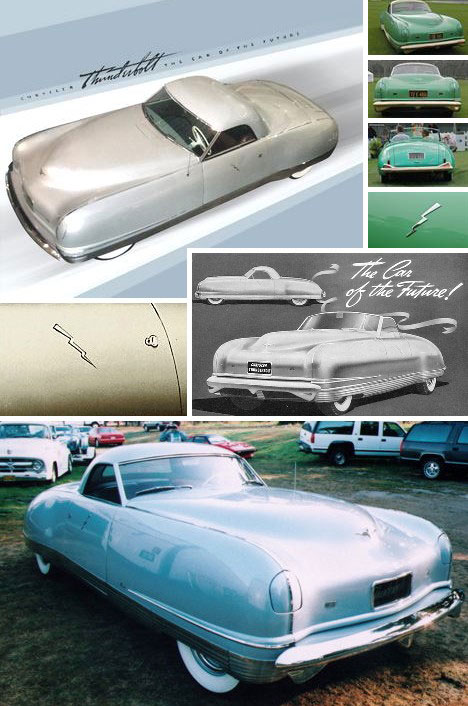 (images via: Imperial Club, Old Car and Truck Pictures and Jay Leno’s Garage)
(images via: Imperial Club, Old Car and Truck Pictures and Jay Leno’s Garage)Chrysler was still shell-shocked from the Airflow affair when it asked acclaimed auto designer Alex Tremulis to work up 5 variations on the Thunderbolt theme. To the great relief of company execs, the “Car of the Future” was a hit at auto shows across the country. Revolutionary for 1940, the five Thunderbolts sported sleek styling at least 10 years ahead of its time. Four of the original Thunderbolts survive; one (above, bottom) being owned by Tonight Show host Jay Leno.
It’s a Car! It’s a Plane!
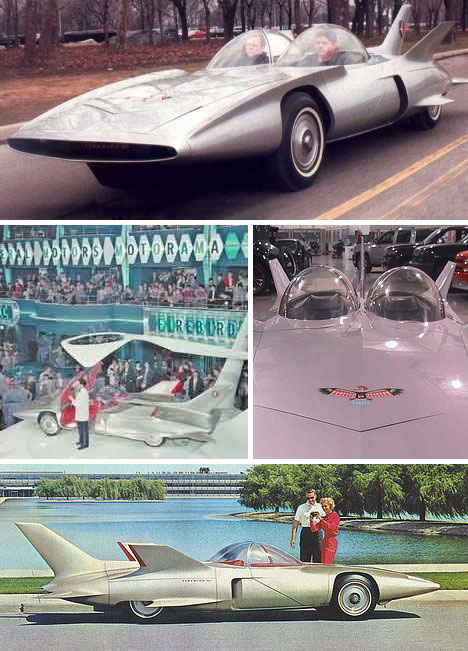 (images via: Obvious and Amphalon)
(images via: Obvious and Amphalon)GM’s Motorama car shows were a fixture of the fabulous Fifties and fans of The General’s futuristic visions couldn’t wait to see what next year’s show would bring. The pressure of continually improving on the most futuristic designs possible led to some truly bizarre concept cars. By 1958 things were really getting out of hand, as illustrated by the outlandish Firebird III. Umm, is that a Screaming Eagle on the hood?
Ford Has a Battier Idea
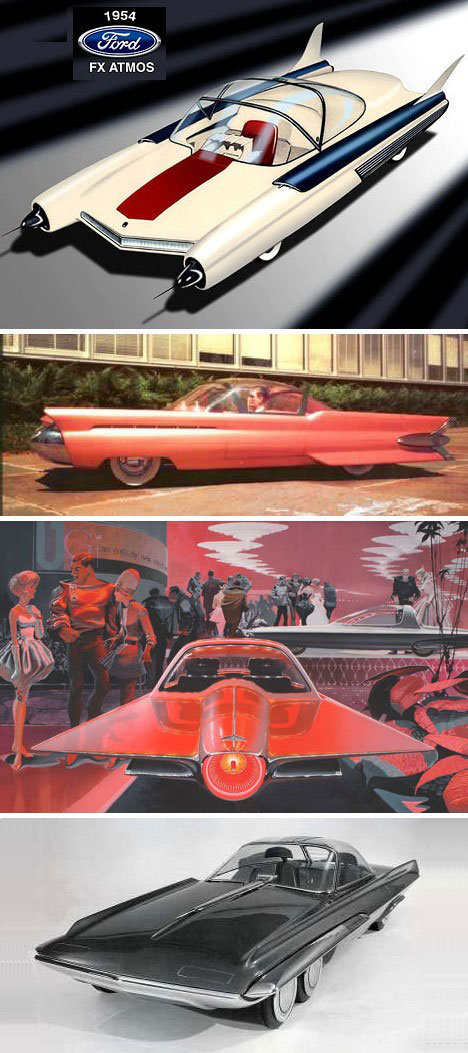 (images via: Auto.cz, Oriole.net, DeSoto58.com and Automotive History Online)
(images via: Auto.cz, Oriole.net, DeSoto58.com and Automotive History Online)Not to be outdone, Ford rolled out a series of strange and stranger concepts during the 1950s and early 1960s. Three wheels, six wheels, anything goes. From the top above, Ford’s 1954 Atmos, 1955 La Tosca, 1961 Guyron and 1962 Seattle-ite XXI.
Enola Gay Decor Package Optional
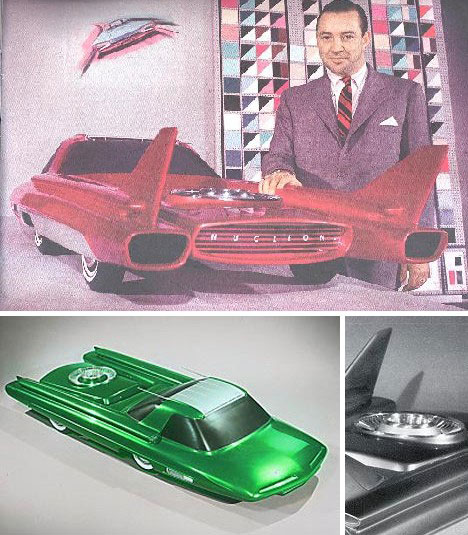 (images via: Vettiliveinnorthcote)
(images via: Vettiliveinnorthcote)Nothing could knock the 1958 Ford Nucleon, however – with a small nuclear reactor humming away under the hood, you’d be afraid to even breathe on it! Yes indeed, with the Nucleon travel was courtesy of Our Friend The Atom and bombing down the boulevard took on a whole new meaning. Goin’ on a fission trip? Stop by your friendly Ford dealer.
Crushed Hopes, Restored Dreams
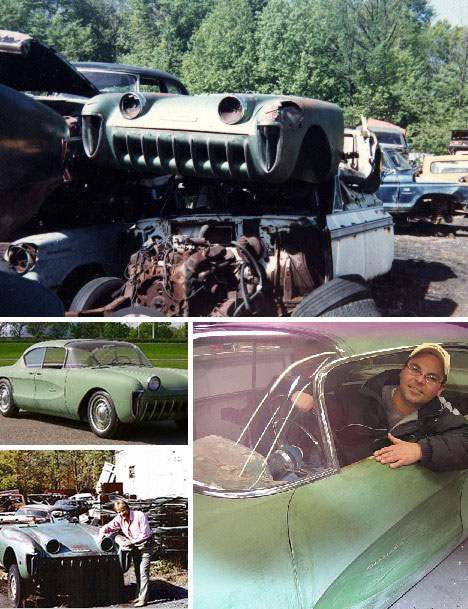 (images via: New York Times and Automobile)
(images via: New York Times and Automobile)Ever wonder what happened to all those wonderful concept cars? Sadly, most came to an unhappy end. GM’s policy regarding concept cars was to disassemble and crush each one once their Motorama days were over – something about “legal issues” as the cars were all prototypes and not officially sanctioned for road use. Not all were completely destroyed, however. Above are the remains of the 1955 Chevrolet Biscayne and La Salle II Sports Coupe at Warhoops Used Auto and Truck Parts in Sterling Heights, Michigan. Former nightclub owner and showcar devotee Joe Bortz is attempting to restore the battered remnants to their former glory.
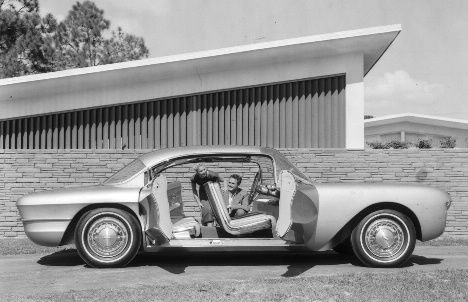 (images via: World Car Fans)
(images via: World Car Fans)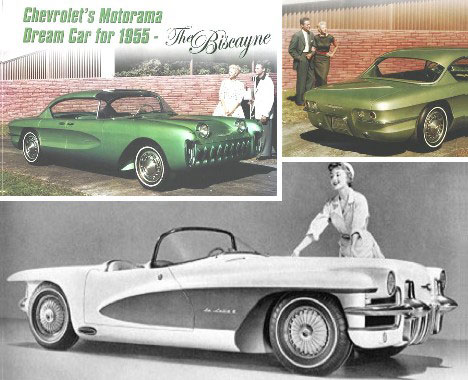 (images via: 55 Classic Chevy and Corvettes.nl)
(images via: 55 Classic Chevy and Corvettes.nl)Above are the Biscayne (in green) and the La Salle II as originally conceived for the 1955 Motorama and associated advertising.
Holy Concept Cars, Batman!
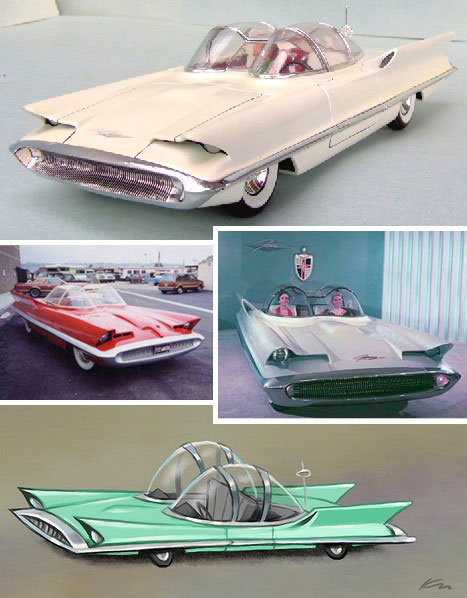 (images via: JavelinAMX and Kirk Millett)
(images via: JavelinAMX and Kirk Millett)Not every show car ended up crushed to smithereens, some took on new lives in unexpected fields. Caves even… like the Bat Cave! It’s no secret that the 1955 Lincoln Futura was recycled 11 years later by kustom kar king George Barris to be Batman & Robin’s rocket-fueled ride.
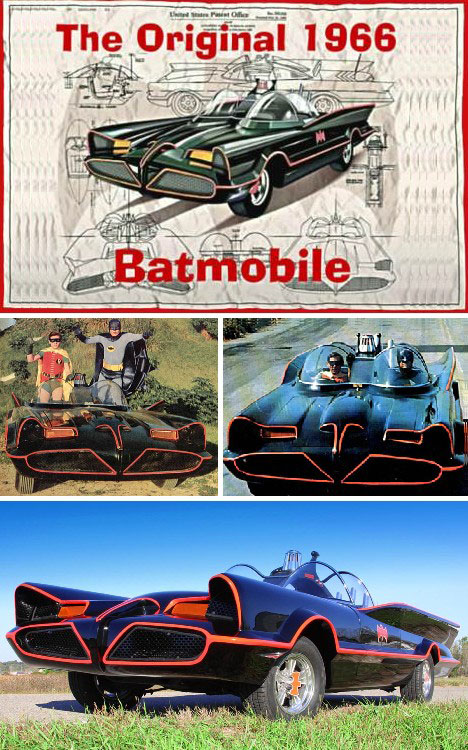 (images via: Bat Blog and Indy Film News)
(images via: Bat Blog and Indy Film News)Though the Futura chassis suffered constant mechanical problems before being replaced by one from a Ford Galaxie during the popular TV show’s first season in 1966, the bubble-top body was kept and remains an icon of 1960s pop culture.
Dodge’s Hot Wheels
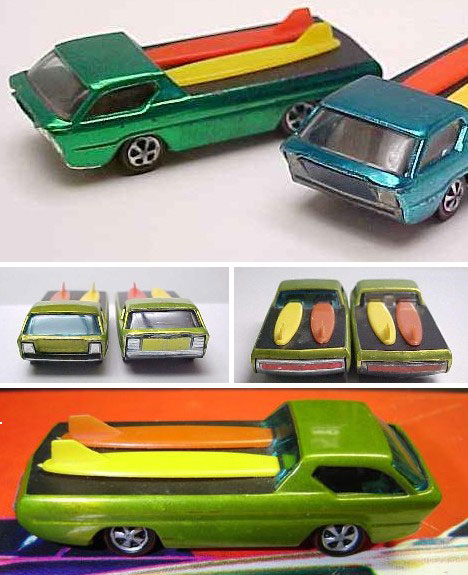 (images via: Online Redline Guide)
(images via: Online Redline Guide)The 1964 Dodge Deora is one of those cars you’re sure you’ve seen somewhere before, even though only one was ever made. Thank Mattel for that – the maker of Hot Wheels added a couple of surfboards to their mini-Deora even though they were never a feature of the show car.
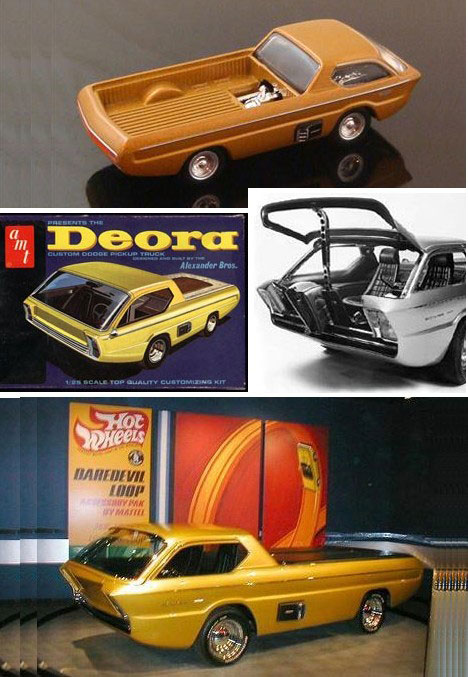 (images via: Motor Trend)
(images via: Motor Trend)Would the Deora have worked as a production vehicle? Probably; cab-forward styling and true minivans (the Deora was based on the new A-100 van) were very popular when introduced by Chrysler in the 1980s.
Eastern Promises Unfulfilled
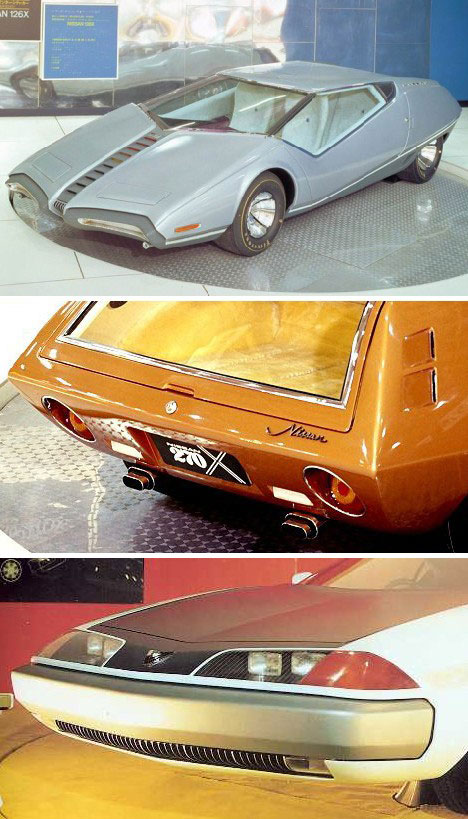 (images via: Concept Nissan)
(images via: Concept Nissan)Concept cars were by no means exclusive to the domestic automakers – both Europe and Japan have rolled out numerous tantalizing concepts and prototypes, usually as a way to boost interest at auto shows. Japan’s Nissan was one of the more adventurous makes in the 1970s as can be seen by the sleek & stylish selection above: from top down, 1970′s 126x and 270x, and from 1971 the 216x which had automatically extending bumpers.
Electric or Eccentric?
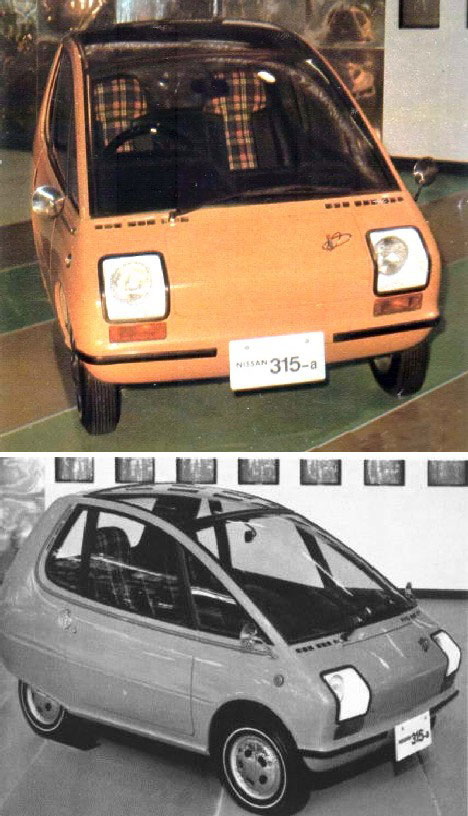 (images via: Concept Nissan)
(images via: Concept Nissan)Perhaps not as exciting in appearance as its show-car brethren, the pint-sized 315a electric commuter concept from 1970 looms large when viewed in hindsight. An electric motor powered the rear wheels of the 95-inch long mighty mite and it could zip from zero to 19 mph in 6 seconds, accelerating on to a 56 mph top “speed”. Actually not bad for ’70… imagine what the 315a would be like today after nearly 40 years of development.
Ferrari’s Stamp of Approval
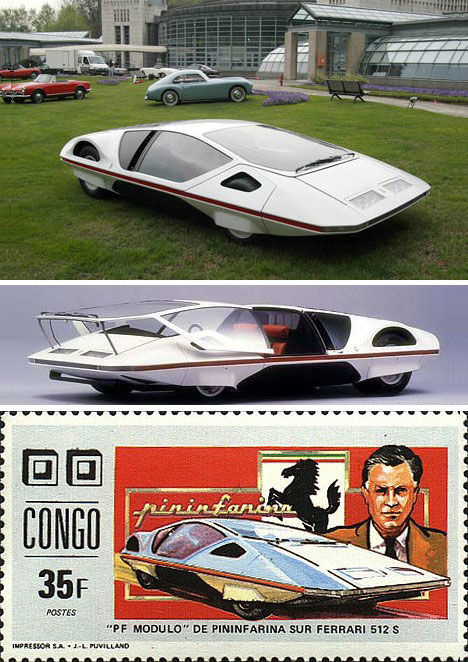 (images via: Flakahoo and Coches 2.0)
(images via: Flakahoo and Coches 2.0)European design means Italy and Italy means Ferrari, whose everyday models look better than most companies’ concept cars. With that said, when Enzo & the boys work up an honest to goodness concept car it was gonna be one spicy meatball – such as the 1970 Ferrari 512 S Modulo. The Modulo was so low, driver and passenger stepped into the car through the roof, which cantilevered forward over the hood. Not many concept cars have their very own postage stamp – the ’70 512 S may be the only one.
After 1970, a host of factors combined to drain the excitement from both auto design and the end product that was offered to the public. Rising insurance premiums discouraged high-powered engines and anything actually sporty, the first Oil Crisis set the target to economy and government regulations enforced the use of hulking bumpers. The age of Anything Goes had come and went – but it was one wild ride while it lasted!
0 comments:
Post a Comment